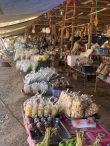The government of Thailand declared a state of emergency to give extra authorities to the government. The governor also imposed a shutdown/lockdown. The biggest number of infected with COVID-19 is in Bangkok and other big cities and urban areas. The number of infected cases in rural areas is comparatively less. However, the most severe problems are economic impacts that are spreading throughout the country.
As most of our member farmers’ organizations (FOs) in Thailand focus on local markets, they are not highly vulnerable. Only those members that supply food to restaurants, depend on tourism, or sell to people outside their communities (e.g. travelers or tourists) are impacted.
As to the impacts of COVID-19 on peasants of Assembly of the Poor (AOP), the AFOSP-APFP national implementing agency in Thailand, they have a problem with restriction of movement, including inter-city travel. The government declared the Decree on Emergency so as to get power to solve the problems. The government also allows provinces to issue the provincial rules on their own which are different from one province to another. There is a curfew being implemented. People cannot be out of home from 10 pm-4 am. In order to go out at night for fishing, catching bullfrogs, or tapping rubber latex, farmers need to apply for a permit. Sometimes, they are granted with a permit, sometimes not.
There are around 700, 000 workers who are out of jobs due to the implemented measures to contain COVID-19 thus, they returned to their provinces. Their farming families need to feed them and earn more money to care for them.
The government provides cash relief of approximately USD 500 per person. But citizens need to register online to get that cash. Many farmers cannot do that, thus, they cannot access the cash relief. The registration for farmers and the poor is difficult compared to the process providing support for the corporates which is easier and clearer.
Besides, other government agencies that are irrelevant to the COVID-19 containment take the opportunity of the pandemic to push for their policies that create troubles for farmers. For example, the policy to remove peasants from the forests, the policy to join CPTPP or the policy to ignore the pressure from peasants’ organizations to ban toxic agrochemicals.
Although there are people who migrate back to provinces due to the lockdown in Bangkok and big cities, so far there are no members of AOP infected with the COVID-19.
The impacts are mostly due to the restriction of mobility and the curfew which was recently announced. As for the restriction of mobility, the sales in the markets with income from travelers, tourists, and restaurants are dropping. The markets are focusing on local people that are affected.
Regarding the curfew, the fisherfolk and Para rubber growing farmers need to travel during the curfew time. But they do not expect problems because the affected members can apply for a permit from the Village Head or Sub-District Head. Besides, the government focuses more on cities and urban areas, with fewer restrictions in rural areas.
As for FOs’ initiatives to address the COVID-19, AOP distributed free cloth masks to their members. They encourage the traveler/tourist-oriented markets to sell to local people. They promote direct selling to urban consumers. They plan to increase production on quick-growing food as an answer to food hoarding and food scarcity. They plan to produce alcohol-based sanitizer from their local rice wine brewery but it is prohibited by the law.

Comments are closed